The Story of Khadijah and Omar
Khadijah is feeling overwhelmed these days as she is:
- feeling stressed with what seems like a never ending TO-DO list
- unable to focus
- juggling between multiple roles, and
- not feeling like she is enough for anyone in her relationships.
She realizes she needs to take care of herself but does not have enough time. She feels guilty for finding her release through binge eating or binge-watching on weeknights which means she’s sleeping later than usual and waking up tired. The entire cycle, night after night, is causing her to lose confidence in her ability to overcome this sense of overwhelm. This is starting to negatively affect the quality of her Salah, and her ability to perform well in her most important roles: both at work and home.
Omar, on the other hand, recently received a promotion, which means he’s moving up the career ladder. While responding to all the messages congratulating him on LinkedIn, he’s feeling a deep sense of dread. He fears the following consequences despite a higher income and a bigger role:
- more responsibility
- nonstop meetings
- late work hours, and
- less time to do things that make him come alive i.e. attending a good Halaqa, reading a good book, playing with friends, and spending some undistracted quality time with the family.
Can you relate to either Khadijah or Omar or maybe both? How do you ground yourself when you are feeling overwhelmed?
What is overwhelm and why do we feel overwhelmed often?
Overwhelm can be defined as the imbalance in your optimal quality of life: our spiritual, emotional, or physical wellness. Why does Overwhelm happen? According to Cognitive Neuroscientist Daniel Levitin, we are exposed to more information, activity, and focus areas than ever before in human history. This is clear when we begin to compare the recent past with the present. For example, in 1976, supermarkets stocked 9,000 items compared to 40,000 today. In 2011, Americans took in five times as much information every day as they did in 1986 –the equivalent of 175 newspapers!
We live in continuous exposure to technology, information, and distractions but are unable to build our schedule and habits in a way that can limit continuous exposure. Setting boundaries is important as it allows us enough time to focus and transition between activities that are most important to us: such as prayer, meaningful work, family, or self-care.
Beyond that, we need silence, presence, reflection, contemplation, to engage in self-accountability, to course correct and build habits and activities that help us operate at our optimal self. But, again, due to the continuous exposure of factors contributing to our overwhelm, most of us do not even know where to begin!
We, humans, are busier, more distracted, and juggling more than ever before in human history, and that also in a resurgent pandemic. As we approach the month of Rabi al-Awwal, what inspirations can we draw from the Prophet (peace be upon him)? How do we address our overwhelm through cultivating a Prophetic Heart?
Overwhelm and its relationship to the nafs
One effective way to start addressing our overwhelm is to detox from technology and create intentional time to cultivate our awareness of God. During this time, we shift ourselves out of a life on autopilot or distractions towards higher awareness and presence with God. This shift teaches us to recognize when we are being led by our nafs, which is one of the root causes of overwhelm.
While addressing the external factors of life is necessary to address and regulate overwhelm, addressing our internal awareness and mindset is even more critical. By changing the mindset, and learning the tools to be closer to God, we can overcome the overwhelms in our life.
Prophetic practice confirms this notion that overwhelm can be cured through disciplining our own nafs. Our beloved Prophet (peace be upon him) used to immediately seek refuge in God when he felt distressed or overwhelmed. He would say:
يا حي يا قيوم ، برحمتك أستغيث ، أصلح لي شأني كله ، ولا تكلني إلى نفسي طرفة عين
Yaa Hayyu Yaa Qayyoom, bi Rahmatika astagheeth, Aslih lee sha’nee kullahu, wa laa takilni ilaa nafsi tarfata ‘aynin
O Ever Living, Ever Sustaining, In You Mercy do I seek refuge, in setting all my affairs right. Do not leave me to my ego for even a blink of an eye.
[Haakim]
Ibn Ata’Illah, a faqih and a Master of Islamic Spiritual Psychology addresses this in his Book of Wisdom: Kitab Al Hikam:
He wrote:
الغـافـل إذا أصبح يـنـظـر مـاذا يـفـعـل
والـعـاقـل يـنـظـر مـاذا يـفـعـل الله به
When the forgetful gets up in the morning, he reflects on what he is going to do, whereas the intelligent sees what God is doing with him.
Since the forgetful man’s gaze is on his own capability, he attributes all his actions to his own self. Allah most high therefore assigns him to his own ego. Thus, all his affairs become difficult and he becomes entrapped in numerous problems. But, for the true believer in Allah’s oneness, the most difficult task does not overwhelm him because his gaze is fixed on Allah, the Most High.
– Commentary, Kitab Al Hikam
Let us apply this mindset shift to the challenges Khadijah and Omar and many of us are experiencing: It is not I but God, who is really in control and He is the Master of all my affairs. This shift can be profound and create a deep impact on lightening the “burden” and easing the overwhelm.
This is also where intentional living with higher awareness and consciousness of Allah’s (SWT) presence and assistance in our life begins to shine through and we accept our role to serve Allah with spiritual excellence and flow. We leave the results to Him and become more focused on showing up as our best self to please Allah (SWT).
Shifting out of our distracted, overwhelmed lower self to our intentional, aware, God-conscious best-self can be the antidote we need spiritually and emotionally to respond effectively to the overwhelm of modern life. Let us explore this in the life of our beloved Prophet (peace be upon him).
Exploring the Prophet’s heart at the lowest point in his life
Once Ayesha (ra) asked the Prophet (peace be upon him) whether Uhud was the toughest day in his life. Our Prophet (peace be upon him) replied in the negative and mentioned that it was actually the day of Taif – the day he was driven out with a mob pelting him with stones from a mountain city, 55 miles away from Makkah.
Why was Taif so difficult? To answer this question, think of the most difficult problem you had in your life when you felt you were at the lowest point of your life. And at that moment – remove the most important pillars of support from your life – no parent, no spouse, no sibling to support you emotionally!
The year the Prophet (peace be upon him) went to Taif, he first lost his parent figure: his uncle Abu Talib. After a few weeks, he lost his beloved wife Khadijah (ra), the most important pillar of support – the first person to affirm his Prophethood, become a Muslim, and spend all her wealth for his cause, the mother of the queen of Jannah i.e. Fatima, and the grandmother of the leaders of all youth in Jannah i.e. Hasan and Husain. He followed these two deep losses with a mission to Taif to find a refuge for his community.
Instead of finding relief, the Prophet (peace be upon him) was mocked by the chieftains of Taif and followed by a mob petting him with stones for miles until the blessed body of the Prophet (peace be upon him) was bleeding.
As the Prophet (peace be upon him) finally sat down after this utter humiliation, how did he process his overwhelm? How did he react to this most difficult day of his life? What were the qualities of his heart that we can emulate to pick ourselves back up from when we are feeling low?
Let us explore the qualities of the Prophet’s heart below through the H.E.A.R.T. Mindfulness Model we introduced on the Productive Muslim blog before (click here to read the article) and how you can apply this model to deal with your personal overwhelming situation:
The Prophet (peace be upon him) thrived with compassion. He achieved so much during that moment of strength and this is reflective in what came afterward — the entire tribe would later become Muslim and from their progeny comes a man named Muhammad bin Qasim Thaqafi, who conquers Sindh and brings Islam to the South Asian diaspora opening the migration of Islam and Muslims to South Asia. Even I, the author of this article, owe my Islam to this connected thread of history!
Most of us do not need to experience our lowest day, but just a simple disappointment is enough for us to lose our capacity for kindness.
Yet, once the Prophet found his healing in the present moment and resolve through mindfulness, purpose, and gratitude, look how he rose with patience, thriving with compassion.
Addressing Khadijah’s overwhelm with the H.E.A.R.T Model
Let’s take this a step further and apply the H.E.A.R.T. Model to Khadijah’s challenge with her overwhelm:
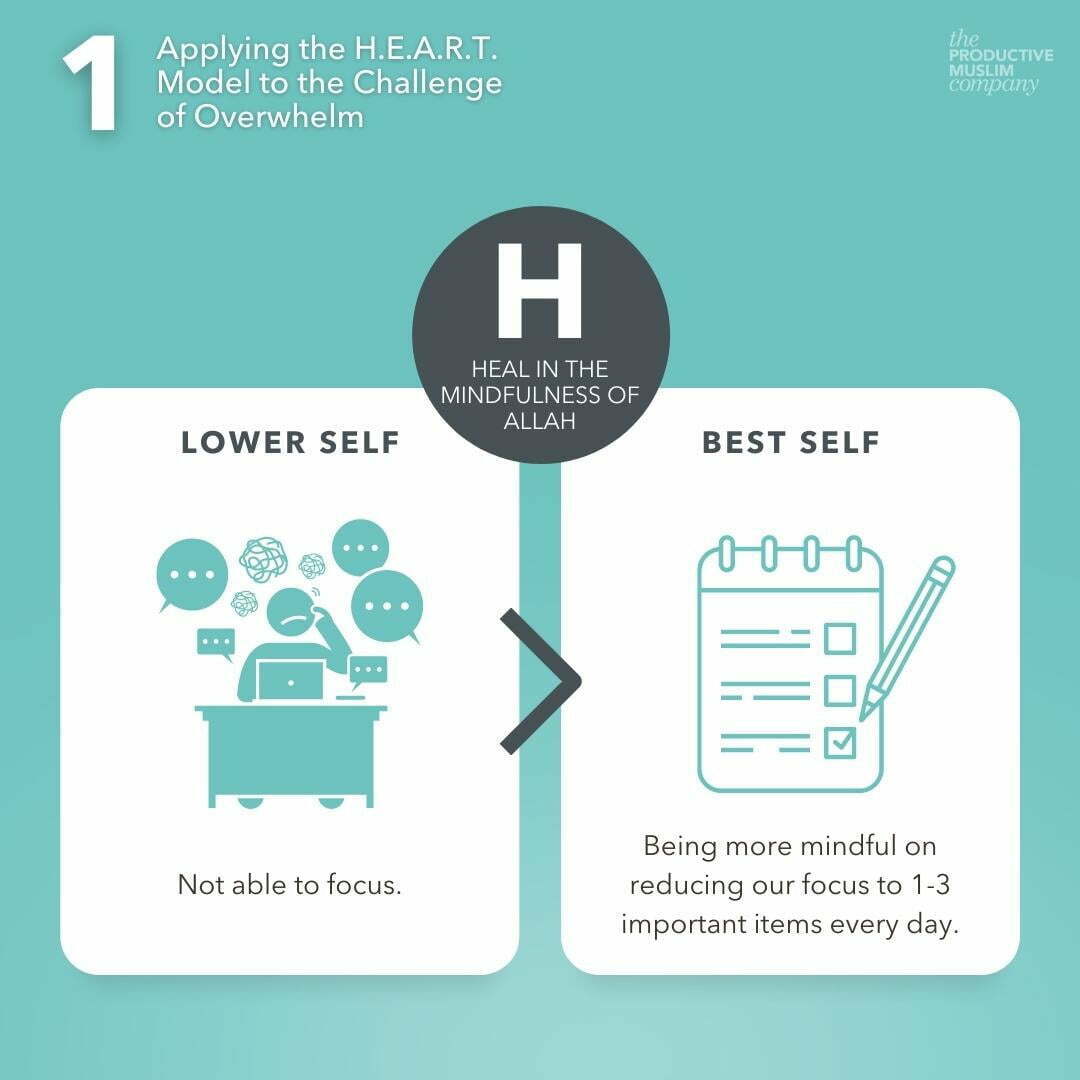

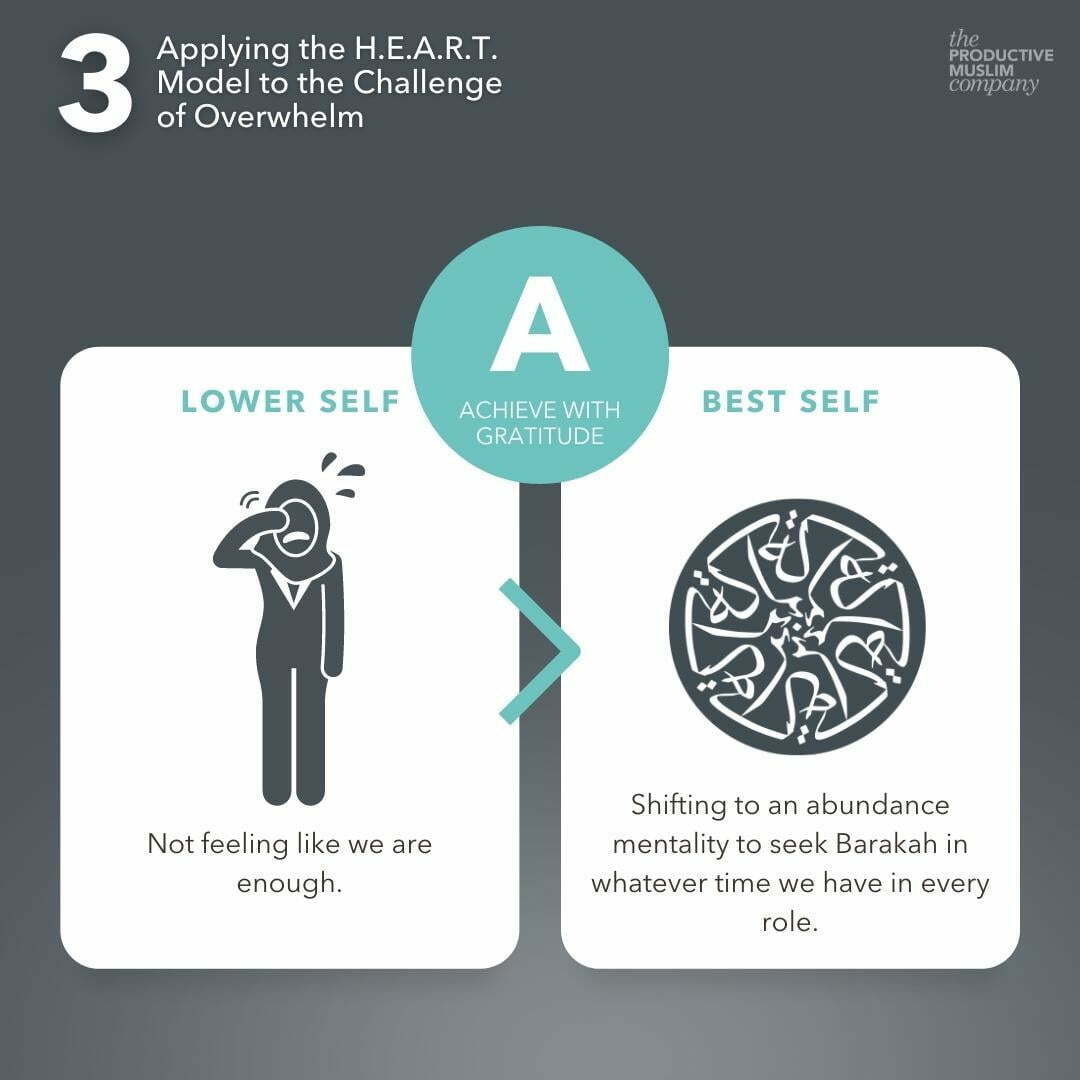
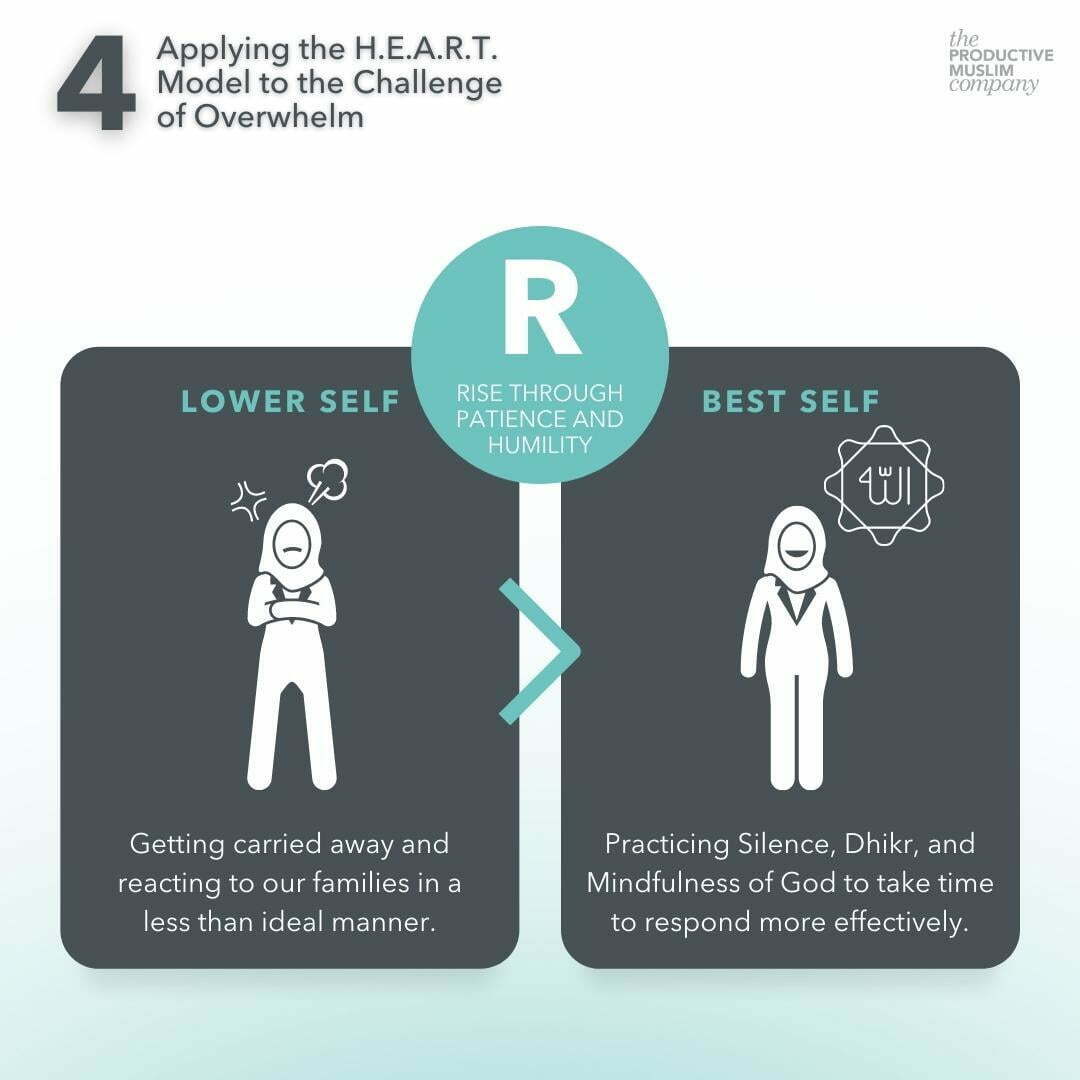
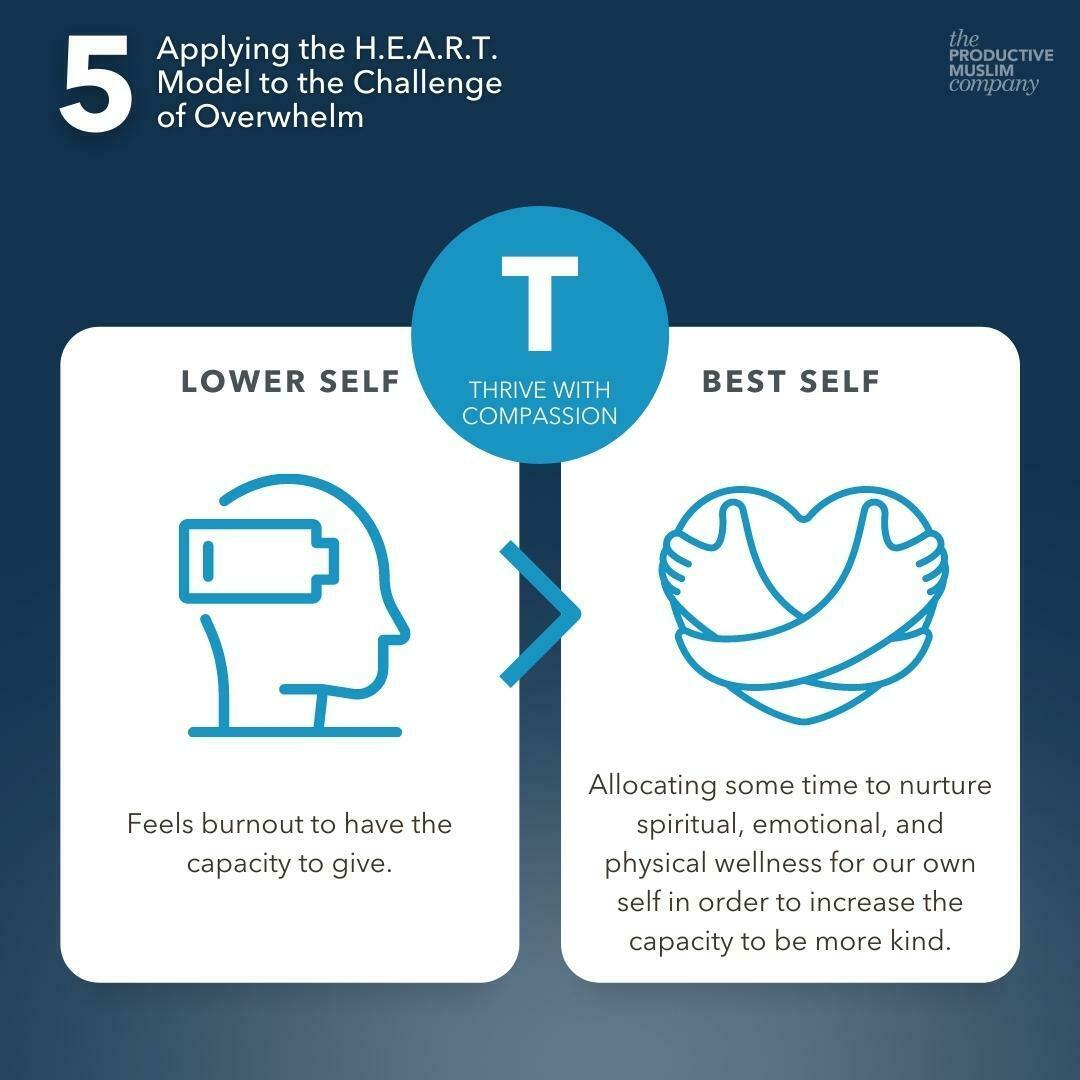
Mindfulness Masterclass this Rabi Al Awwal
Mindfulness, purpose, gratitude, patience, and compassion – this Rabi Al Awwal, we will learn to practice these Prophetic qualities through the Mindfulness Masterclass, where we work through and learn practical and immediately applicable tools through the intersection of neuroscience and Islamic Spiritual Psychology.
This is our 5th cohort of the Mindfulness Masterclass and we’ll be joined by alumni who have felt their lives transformed as a result of this Masterclass.
“This is a life-changing class… I’m more present in my Salat, I’m practicing mindfulness on daily basis using some of Br. Wadud’s practices, and I’m approaching life from being energy rather than doing energy, AND… I’m able to accomplish more!”
Amal Essader
During the 6 week Masterclass, you’ll invest in your spiritual and emotional wellbeing and learn how to cultivate a Prophetic H.E.A.R.T. We’ll cover the following:
H – Heal in His Presence
Shifting from living on autopilot to intentional living.
- Understanding the H.E.A.R.T. Model.
- Understanding neuroscience vs. the Islamic concept of mindfulness.
- Exploring the scientific benefits of mindfulness and meditation.
- Acquiring both neuroscience and Islamic tools for training your focus.
- Practically learning the methods of “Muraqaba” or meditation of three Islamic scholars: Al Muhasibi, Ibn Qayim, and Ibn Ata’Illah.
- Understanding the science-based mindfulness meditation.
E – Engage with Purpose
From mindfulness of God to deep awareness and actualization of your purpose in life. How to develop the resilience—that’s connected to excellence, optimism, and affirmation of faith and prayer—to achieve your goals.
- The power of purpose both Islamically and through evidence-based modern research.
- Developing a statement of purpose connected to your personal core values.
- The mindset needed to refocus when you steer off your purpose.
- Experiencing the “purpose meditation” to claim your worth and focus on your goals despite failures/setbacks.
A – Achieve with Gratitude
Evolving from mindfulness to being grateful to the Bestower. Linking gratitude to neuroscience, productivity, and peak performance.
- The Quranic and Prophetic principles and promise connected to gratitude.
- The neuroscience-based benefits of gratitude.
- Experiencing a “mindfulness-based” gratitude meditation.
- The concept and steps of reframing to upgrade from scarcity to abundance-mindset.
R – Rise with Patience and Humility
How to rise beyond the challenges of this world by welcoming and regulating difficult emotions. Discovering our internal selves. Exploring your strengths, weaknesses, and triggers.
- The science behind emotions.
- Practicing a body scan meditation to be aware of your emotions.
- Imam Ghazzali’s spiritual self-awareness meditation.
- How journaling can be used as a tool for self-awareness.
- Tools for regulating difficult thoughts, emotions, and practicing patience.
T – Thrive with Compassion
How mindfulness, awareness, and deep connection to The Most Merciful God fuels the way we show up and connect with the world – starting with family. Overcoming the stresses of interpersonal relationships, communication, and leadership.
- The emerging evidence-based research on compassion and its effect on leadership.
- Differentiating between empathy and compassion.
- Practicing “compassion meditation”.
- The steps of the Prophetic Model of Compassion.
Wadud Hassan, co-founder of the upcoming Muslim Mindfulness app: Muraqaba
Whether you join the Mindfulness Masterclass or not, stay ahead of overwhelm by shifting from auto-pilot to awareness, and by cultivating presence and inner calm in the practices you already have:
Spiritually: Make a slow and mindful wudhu to wash off your stress and prime yourself to be more present and grounded when you stand for Salah.
Emotionally: Take a few deep breaths with Dhikr when you are on the go, take a few minutes to transition between tasks, practice silence every day to take perspective, forgive, and let go.
Physically: Disconnect from your phone and immerse yourself in nature or just the present moment when taking a walk or doing your daily exercise.
Socially: Leave your phone away from the family musallah, living, or dining area, and connect with the family with all your heart while praying, playing, eating, or reading a book together.
And don’t forget the power of du’a! Incorporate in the du’a of the Prophet (peace be upon him) to seek refuge and shelter in the mercy and awareness of Allah (SWT).
يا حي يا قيوم ، برحمتك أستغيث ، أصلح لي شأني كله ، ولا تكلني إلى نفسي طرفة عين
Yaa Hayyu Yaa Qayyoom, bi Rahmatika astagheeth, Aslih lee sha’nee kullahu, wa laa takilni ilaa nafsi tarfata ‘aynin
O Ever Living, Ever Sustaining, In You Mercy do I seek refuge, in setting all my affairs right. Do not leave me to my ego for even a blink of an eye. [Haakim]








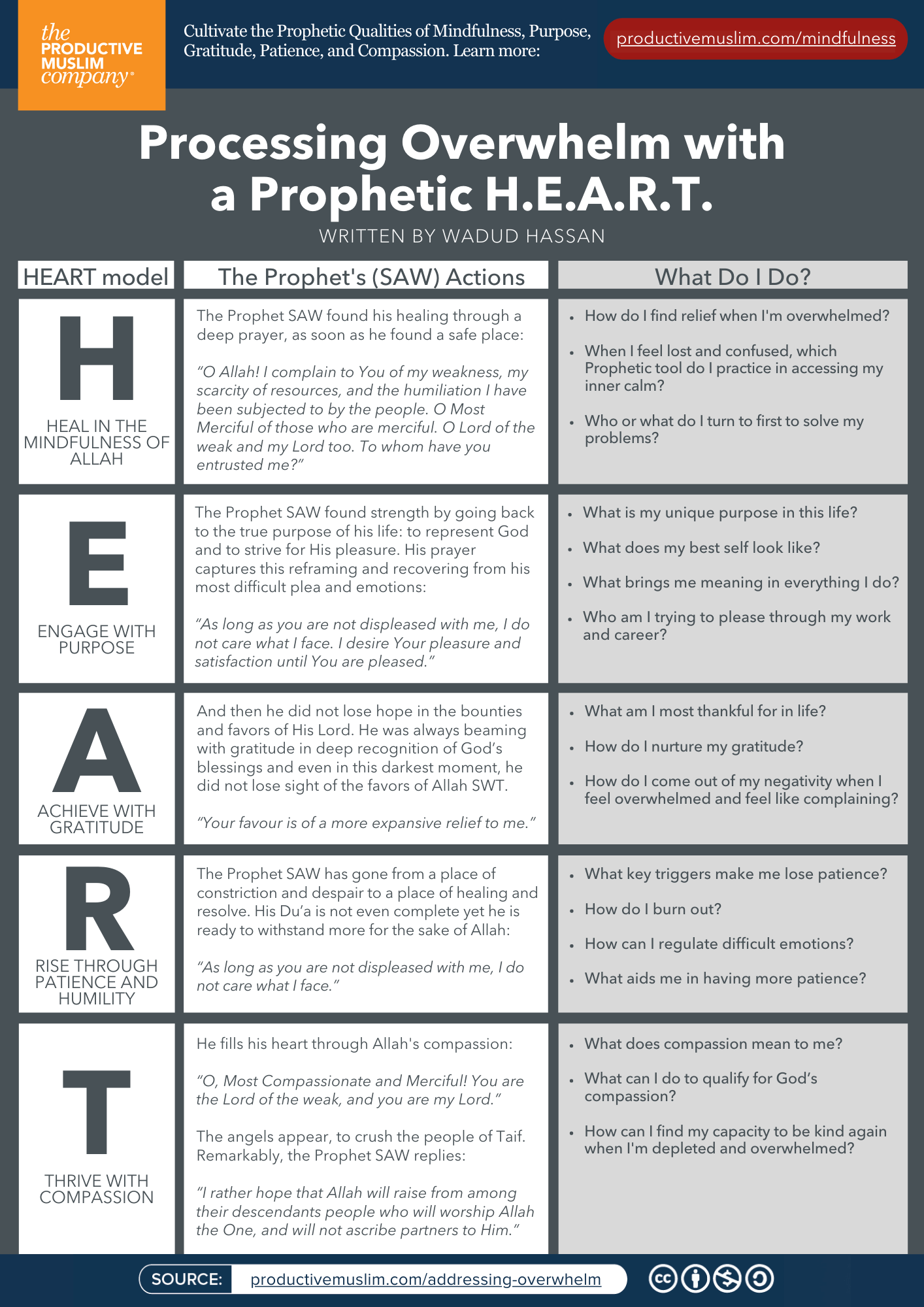
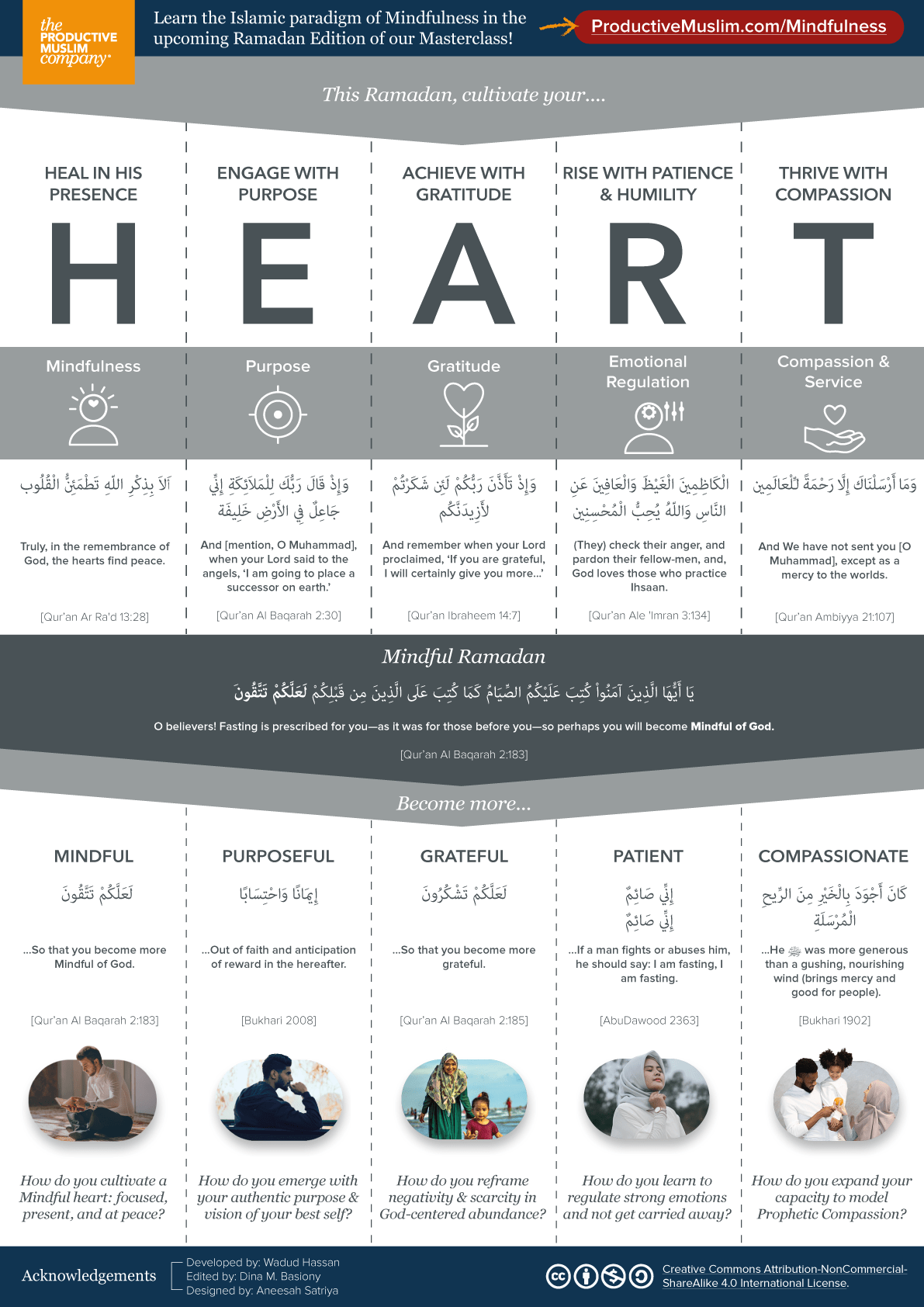





Leave a Reply